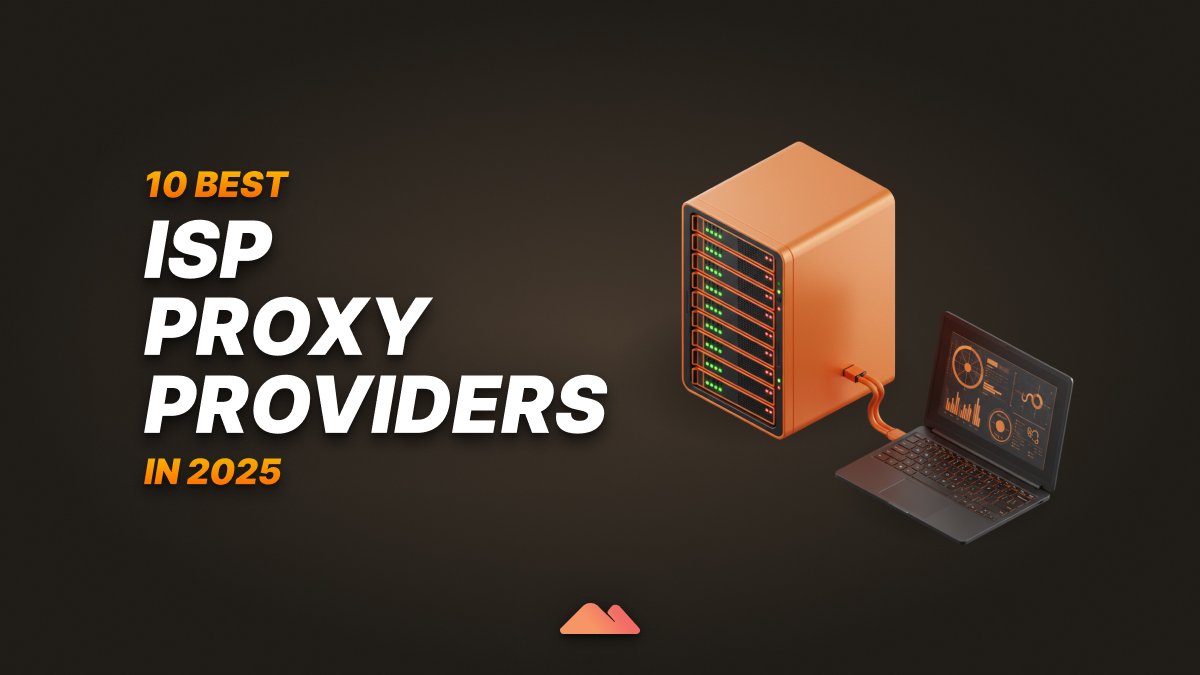When you’re choosing the right type of proxy for scraping, privacy, or automation, two top options come up: ISP proxies and residential proxies.
Both can hide your real IP address and help you access geo-restricted or protected content, but they work differently, and choosing the wrong one can result in wasted time, money, and blocked requests.
TL;DR
If you just want the short answer:
✅ Use ISP proxies when you need faster speeds, high trust scores, and static IPs for tasks like account management or ad verification.
✅ Use residential proxies when you need millions of real IPs, maximum geo-targeting, and rotating sessions for large-scale scraping.
Here’s a side-by-side breakdown:
<table class="GeneratedTable">
<thead>
<tr>
<th>Feature</th>
<th>ISP Proxies</th>
<th>Residential Proxies</th>
</tr>
</thead>
<tbody>
<tr>
<td>IP Source</td>
<td>Datacenter IPs registered with an ISP</td>
<td>Real residential users via ISPs</td>
</tr>
<tr>
<td>Speed & Stability</td>
<td>High speeds, low latency</td>
<td>Good speed but varies with user connections</td>
</tr>
<tr>
<td>Trust & Block Rates</td>
<td>Highly trusted, appears as a real residential</td>
<td>Very trusted, but some IPs may be reused</td>
</tr>
<tr>
<td>Rotation</td>
<td>Static or semi-static</td>
<td>Rotating pools (millions of IPs)</td>
</tr>
<tr>
<td>Session Duration</td>
<td>Long-term stable sessions</td>
<td>Short to medium sessions</td>
</tr>
<tr>
<td>Geographic Coverage</td>
<td>Limited locations, high quality</td>
<td>Extensive global coverage</td>
</tr>
<tr>
<td>Best For</td>
<td>Social media management, ad verification, e-commerce checkout, sneakers</td>
<td>Web scraping at scale, geo-fencing, price monitoring</td>
</tr>
<tr>
<td>Price</td>
<td>$2-8 per IP/month</td>
<td>$0.50-4.00 per GB</td>
</tr>
<tr>
<td>Setup Complexity</td>
<td>Beginner-friendly</td>
<td>Moderate complexity</td>
</tr>
</tbody>
</table>
What is an ISP Proxy?
An ISP proxy (sometimes called a static residential proxy) combines the speed of a datacenter IP with the trust of a residential IP.
The IPs are assigned by real Internet Service Providers (ISPs) but hosted on servers in data centers - so they’re stable and less likely to get blocked.
What is a Residential Proxy?
A residential proxy routes your traffic through real user devices connected to residential ISPs.
You get huge IP pools with real-world diversity - ideal for tasks that need to look like everyday browsing.
Key Differences: ISP vs Residential Proxies
Source of IPs
- ISP Proxies: Datacenter IPs assigned by an ISP. They appear as residential but stay static.
- Residential Proxies: Real devices and home networks - millions of constantly changing IPs.
Speed & Reliability
- ISP Proxies: Faster and more reliable, as they run on servers with strong bandwidth.
- Residential Proxies: Depend on the end user’s network - some connections might be slower.
Pricing Differences
- ISP Proxies: Billed per IP; higher cost due to trustworthiness and stability.
- Residential Proxies: Pay-as-you-go based on bandwidth or ports - better for large tasks.
Trust & Block Rates
- Both look “real” to target sites, but ISP proxies can be more consistent for static sessions.
- Residential proxies’ rotating IPs mean better stealth at scale but can raise flags if abused.
Best Use Cases for ISP Proxies
When should you choose ISP proxies?
✅ Account management: Stay under the radar when managing multiple social profiles with consistent IP reputation.
✅ Ad verification: Check ads as a "real user" without constant IP rotation - success rates typically 70-85% higher than datacenter proxies.
✅ E-commerce checkout: Get faster speeds when buying limited stock items with same-IP session continuity.
✅ Sneaker copping: Static trusted IPs reduce bans when bots hit sneaker drops, with success rates 60-80% higher than rotating IPs.
Best Use Cases for Residential Proxies
When are residential proxies better?
✅ Large-scale web scraping: Millions of IPs reduce blocks when scraping e-commerce, travel sites, or SERPs - handle 10x more requests before rate limiting.
✅ Geo-fenced content: Appear as local users in different cities or countries with authentic location data.
✅ Market research & price monitoring: Collect competitive data without CAPTCHAs or bans across multiple markets simultaneously.
✅ Ad fraud prevention: Rotate IPs to verify ad placements globally with real user behavior patterns.
Decision Tree: Which Proxy Type Should You Choose?
Start here: What's your primary goal?
🔄 High-volume data collection? → Residential proxies
📊 Account management or verification? → ISP proxies
🌍 Need 50+ geographic locations? → Residential proxies
⚡ Speed and stability critical? → ISP proxies
💰 Budget under $100/month? → Consider residential proxies first
For Small Businesses & Beginners
Start with ISP proxies if you need fewer than 10 IPs and want a simpler setup. They're more predictable and easier to manage.
For Enterprise & Scale Operations
Residential proxies offer better value for large-scale operations, but consider using both: ISP proxies for trusted accounts, residential proxies for scale.
Practical Considerations
Setup Complexity
- ISP Proxies: Straightforward configuration, usually IP whitelisting or username/password
- Residential Proxies: May require session management and rotation configuration
Provider Selection Factors
- 24/7 support availability
- SLA guarantees and uptime commitments
- Geographic coverage that matches your needs
- Transparent pricing without hidden fees
Red Flags to Avoid
- Unlimited bandwidth promises at suspiciously low prices
- No clear terms of service or acceptable use policy
- Lack of customer support or technical documentation

I am the co-founder & CEO of Massive. In addition to working on startups, I am a musician, athlete, mentor, event host, and volunteer.
Customer reviews
Frequently Asked Question
Are ISP proxies better than residential proxies?
+
Not always - they serve different needs. ISP proxies are faster and great for static tasks, but residential proxies give you more IPs and better stealth for big scraping jobs.
Which proxy type is more cost-effective for small businesses?
+
For businesses needing fewer than 20 IPs, ISP proxies often provide better value due to predictable monthly costs and higher success rates.
Are ISP proxies legal?
+
Yes - ISP proxies and residential proxies are legal tools. Just use them responsibly and check site T&Cs to avoid misuse.
Do residential proxies get blocked more easily?
+
No - they're harder to block because they come from real user connections. But bad configuration or excessive requests can still raise red flags.
Can I switch between proxy types with the same provider?
+
Many premium providers offer both types, allowing you to switch based on your current needs. This flexibility is valuable for growing businesses.










